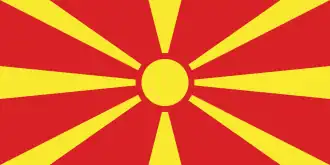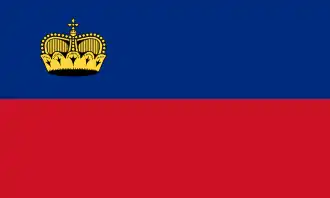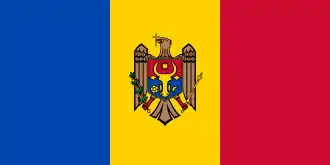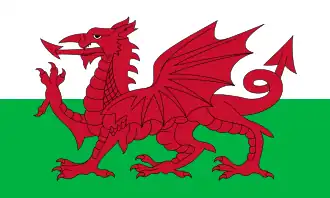2019 UEFA European Under-17 Championship qualification|
| Dates | Qualifying round:
27 September – 2 November 2018
Elite round:
20 March – 1 April 2019 |
|---|
| Teams | 54 (from 1 confederation) |
|---|
|
| Matches played | 126 |
|---|
| Goals scored | 441 (3.5 per match) |
|---|
| Top scorer(s) |  Kirill Shchetinin (8 goals) Kirill Shchetinin (8 goals) |
|---|
|
The 2019 UEFA European Under-17 Championship qualifying competition was a men's under-17 football competition that determined the 15 teams joining the automatically qualified hosts Republic of Ireland in the 2019 UEFA European Under-17 Championship final tournament.[1]
Apart from Republic of Ireland, all remaining 54 UEFA member national teams entered the qualifying competition.[2] Players born on or after 1 January 2002 were eligible to participate. Starting from this season, up to five substitutions are permitted per team in each match.[3] Moreover, each match has a regular duration of 90 minutes, instead of 80 minutes in previous seasons.
The qualifying competition consists of two rounds:[4]
- Qualifying round: Apart from England and Germany, which receive byes to the elite round as the teams with the highest seeding coefficient, the remaining 52 teams are drawn into 13 groups of four teams. Each group is played in single round-robin format at one of the teams selected as hosts after the draw. The 13 group winners, the 13 runners-up, and the four third-placed teams with the best record against the first and second-placed teams in their group advance to the elite round.
- Elite round: The 32 teams are drawn into eight groups of four teams. Each group is played in single round-robin format at one of the teams selected as hosts after the draw. The eight group winners and the seven runners-up with the best record against the first and third-placed teams in their group qualify for the final tournament.
The schedule of each group is as follows, with two rest days between each matchday (Regulations Article 20.04):[4]
Group schedule
| Matchday
|
Matches
|
| Matchday 1
|
1 v 4, 3 v 2
|
| Matchday 2
|
1 v 3, 2 v 4
|
| Matchday 3
|
2 v 1, 4 v 3
|
Tiebreakers
In the qualifying round and elite round, teams are ranked according to points (3 points for a win, 1 point for a draw, 0 points for a loss), and if tied on points, the following tiebreaking criteria are applied, in the order given, to determine the rankings (Regulations Articles 14.01 and 14.02):[4]
- Points in head-to-head matches among tied teams;
- Goal difference in head-to-head matches among tied teams;
- Goals scored in head-to-head matches among tied teams;
- If more than two teams are tied, and after applying all head-to-head criteria above, a subset of teams are still tied, all head-to-head criteria above are reapplied exclusively to this subset of teams;
- Goal difference in all group matches;
- Goals scored in all group matches;
- Penalty shoot-out if only two teams have the same number of points, and they met in the last round of the group and are tied after applying all criteria above (not used if more than two teams have the same number of points, or if their rankings are not relevant for qualification for the next stage);
- Disciplinary points (red card = 3 points, yellow card = 1 point, expulsion for two yellow cards in one match = 3 points);
- UEFA coefficient for the qualifying round draw;
- Drawing of lots.
To determine the four best third-placed teams from the qualifying round and the seven best runners-up from the elite round, the results against the teams in fourth place are discarded. The following criteria are applied (Regulations Articles 15.01, 15.02 and 15.03):[4]
- Points;
- Goal difference;
- Goals scored;
- Disciplinary points;
- UEFA coefficient for the qualifying round draw;
- Drawing of lots.
Qualifying round
Draw
The draw for the qualifying round was held on 6 December 2017, 09:00 CET (UTC+1), at the UEFA headquarters in Nyon, Switzerland.[5][6]
The teams were seeded according to their coefficient ranking, calculated based on the following (a four-year window was used instead of the previous three-year window):[7]
Each group contained one team from Pot A, one team from Pot B, one team from Pot C, and one team from Pot D. For political reasons, Russia and Ukraine, Spain and Gibraltar, Serbia and Kosovo, and Bosnia and Herzegovina and Kosovo would not be drawn in the same group.[2]
Teams entering qualifying round
|
|
|
|
|
- Notes
- Teams marked in bold have qualified for the final tournament.
Groups
The qualifying round must be played by 20 November 2018.[6]
Times up to 27 October 2018 are CEST (UTC+2), thereafter times are CET (UTC+1), as listed by UEFA (local times, if different, are in parentheses).
Group 1
Group 2
Group 3
Group 4
Group 5
Group 6
Group 7
Group 8
Group 9
Group 10
The Northern Ireland v Slovakia match, kick-off on 24 October, 13:00 TRT, was abandoned after 13 minutes due to adverse weather conditions, with the remainder of the game played on 25 October, 13:00 TRT. The Turkey v San Marino match, scheduled for kick-off on 24 October, 16:30 TRT, was also postponed due to adverse weather conditions, and rescheduled to 25 October, 15:00 TRT.[8]
Group 11
Group 12
Group 13
Ranking of third-placed teams
To determine the four best third-placed teams from the qualifying round which advance to the elite round, only the results of the third-placed teams against the first and second-placed teams in their group are taken into account.
Source:
UEFARules for classification: 1) points; 2) goal difference; 3) goals scored; 4) disciplinary points; 5) coefficient; 6) drawing of lots.
Elite round
Draw
The draw for the elite round was held on 6 December 2018, 11:45 CET (UTC+1), at the UEFA headquarters in Nyon, Switzerland.[9][10]
The teams were seeded according to their results in the qualifying round.[11] England and Germany, which received byes to the elite round, were automatically seeded into Pot A. Each group contained one team from Pot A, one team from Pot B, one team from Pot C, and one team from Pot D. Winners and runners-up from the same qualifying round group could not be drawn in the same group, but the best third-placed teams could be drawn in the same group as winners or runners-up from the same qualifying round group. For political reasons, Kosovo would not be drawn in the same group as either Serbia or Bosnia and Herzegovina.
Source:
UEFARules for classification: 1) points; 2) goal difference; 3) goals scored; 4) disciplinary points; 5) coefficient; 6) drawing of lots.
(Y) Third-placed teams from qualifying round (may be drawn with teams from same qualifying round group)
Notes:
- ^ a b Disciplinary points: Belgium 0, Czech Republic 2.
Groups
The elite round is scheduled to be played by the end of March 2019.
Times up to 30 March 2019 are CET (UTC+1), thereafter times are CEST (UTC+2), as listed by UEFA (local times, if different, are in parentheses).
Group 1
Group 2
Group 3
Group 4
Group 5
Note: Spain were originally to host the group between 20 and 26 March 2019, but were removed by UEFA as Spain do not recognize Kosovo's independence and would not allow the display of Kosovan symbols. As Ukraine and Greece, the other two teams in the group, also do not recognize Kosovo's independence, UEFA decided the group would be played in the neutral host country Switzerland between 25 and 31 March 2019.[12]
Group 6
Group 7
Group 8
Ranking of second-placed teams
To determine the seven best second-placed teams from the elite round which qualify for the final tournament, only the results of the second-placed teams against the first and third-placed teams in their group are taken into account.
Source:
UEFARules for classification: 1) points; 2) goal difference; 3) goals scored; 4) disciplinary points; 5) coefficient; 6) drawing of lots.
Qualified teams
The following 16 teams qualify for the final tournament.
| Team
|
Qualified as
|
Qualified on
|
Previous appearances in Under-17 Euro1
only U-17 era (since 2002)
|
 Republic of Ireland Republic of Ireland |
Hosts |
9 December 2016[1] |
4 (2008, 2015, 2017, 2018)
|
 Italy Italy |
Elite round Group 1 winners |
26 March 2019 |
8 (2003, 2005, 2009, 2013, 2015, 2016, 2017, 2018)
|
 Netherlands Netherlands |
Elite round Group 2 winners |
26 March 2019 |
12 (2002, 2005, 2007, 2008, 2009, 2011, 2012, 2014, 2015, 2016, 2017, 2018)
|
 England England |
Elite round Group 3 winners |
27 March 2019 |
13 (2002, 2003, 2004, 2005, 2007, 2009, 2010, 2011, 2014, 2015, 2016, 2017, 2018)
|
 Iceland Iceland |
Elite round Group 4 winners |
26 March 2019 |
2 (2007, 2012)
|
 Spain Spain |
Elite round Group 5 winners |
31 March 2019 |
12 (2002, 2003, 2004, 2006, 2007, 2008, 2009, 2010, 2015, 2016, 2017, 2018)
|
.svg.png) Portugal Portugal |
Elite round Group 6 winners |
26 March 2019 |
7 (2002, 2003, 2004, 2010, 2014, 2016, 2018)
|
.svg.png) Belgium Belgium |
Elite round Group 7 winners |
29 March 2019 |
6 (2006, 2007, 2012, 2015, 2016, 2018)
|
.svg.png) France France |
Elite round Group 8 winners |
29 March 2019 |
11 (2002, 2004, 2007, 2008, 2009, 2010, 2011, 2012, 2015, 2016, 2017)
|
 Austria Austria |
Elite round best seven runners-up |
26 March 2019 |
5 (2003, 2004, 2013, 2015, 2016)
|
 Russia Russia |
Elite round best seven runners-up |
26 March 2019 |
3 (2006, 2013, 2015)
|
 Hungary Hungary |
Elite round best seven runners-up |
29 March 2019 |
4 (2002, 2003, 2006, 2017)
|
 Sweden Sweden |
Elite round best seven runners-up |
1 April 2019 |
3 (2013, 2016, 2018)
|
 Greece Greece |
Elite round best seven runners-up |
31 March 2019 |
2 (2010, 2015)
|
 Czech Republic Czech Republic |
Elite round best seven runners-up |
26 March 2019 |
5 (2002, 2006, 2010, 2011, 2015)
|
 Germany Germany |
Elite round best seven runners-up |
27 March 2019 |
11 (2002, 2006, 2007, 2009, 2011, 2012, 2014, 2015, 2016, 2017, 2018)
|
1 Bold indicates champions for that year. Italic indicates hosts for that year.
Goalscorers
In the qualifying round, there were 309 goals scored in 78 matches, for an average of 3.96 goals per match.
In the elite round, there were 132 goals scored in 48 matches, for an average of 2.75 goals per match.
In total, there were 441 goals scored in 126 matches, for an average of 3.5 goals per match.
8 goals
7 goals
6 goals
5 goals
4 goals
3 goals
2 goals
1 goal
1 own goal
Source: UEFA.com[13]
References
External links
|
|---|
Under-16 era, 1982–2001 | | Tournaments | |
|---|
| Qualification | |
|---|
| Squads | |
|---|
|
Under-17 era, 2002–present | | Tournaments | |
|---|
| Qualification |
- 2002
- 2003
- 2004 (First, Second)
- 2005 (First, Elite)
- 2006 (First, Elite)
- 2007 (First, Elite)
- 2008 (First, Elite)
- 2009 (First, Elite)
- 2010 (First, Elite)
- 2011 (First, Elite)
- 2012 (First, Elite)
- 2013 (First, Elite)
- 2014 (First, Elite)
- 2015
- 2016
- 2017
- 2018
- 2020
2021- 2022
- 2023
- 2024
- 2025
- 2026
|
|---|
| Squads | |
|---|
|
|
|---|
| Domestic leagues | |
|---|
| Domestic cups | |
|---|
| League cups | |
|---|
| Supercups | |
|---|
| UEFA competitions | |
|---|
| International competitions | |
|---|
 Deniz Pehlivan
Deniz Pehlivan Vojtěch Wojatschke
Vojtěch Wojatschke Ákos Zuigeber
Ákos Zuigeber Andri Guðjohnsen
Andri Guðjohnsen Mohamed Taabouni
Mohamed Taabouni.svg.png) Ben Wylie
Ben Wylie.svg.png) Famana Quizera
Famana Quizera Louis Munteanu
Louis Munteanu Karl Landsten
Karl Landsten Eric Shuranov
Eric Shuranov Heorhii Sudakov
Heorhii Sudakov.svg.png) François Xavier Engolo
François Xavier Engolo.svg.png) Franck Idumbo-Mazumbo
Franck Idumbo-Mazumbo Ajdin Jusupović
Ajdin Jusupović Martin Petkov
Martin Petkov Jakov Anton Vasilj
Jakov Anton Vasilj Adam Hložek
Adam Hložek Noah Crone
Noah Crone.svg.png) Adil Aouchiche
Adil Aouchiche Liroy Gabay
Liroy Gabay Franco Tongya
Franco Tongya Sontje Hansen
Sontje Hansen Ki-Jana Hoever
Ki-Jana Hoever Fredrik Oppegård
Fredrik Oppegård Filip Marchwiński
Filip Marchwiński Ianis Stoica
Ianis Stoica Egor Shapovalov
Egor Shapovalov Roman Čerepkai
Roman Čerepkai Tomáš Suslov
Tomáš Suslov Vanja Panič
Vanja Panič Kepa Uriarte
Kepa Uriarte Sebastian Nanasi
Sebastian Nanasi Benjamin Böckle
Benjamin Böckle Yusuf Demir
Yusuf Demir Bernhard Zimmermann
Bernhard Zimmermann Aleksandr Shestyuk
Aleksandr Shestyuk.svg.png) Chris Kalulika
Chris Kalulika Faruk Duraković
Faruk Duraković Gabriel Groznica
Gabriel Groznica Antonín Svoboda
Antonín Svoboda Hektor Højberre-Thomsen
Hektor Højberre-Thomsen Sam Greenwood
Sam Greenwood Noni Madueke
Noni Madueke Morgan Rogers
Morgan Rogers.svg.png) Lucien Agoumé
Lucien Agoumé.svg.png) Teo Zidane
Teo Zidane Karim Adeyemi
Karim Adeyemi Andri Fannar Baldursson
Andri Fannar Baldursson Danijel Dejan Djuric
Danijel Dejan Djuric Mikael Egill Ellertsson
Mikael Egill Ellertsson Davíð Snær Jóhannsson
Davíð Snær Jóhannsson Suf Podgoreanu
Suf Podgoreanu Tal Torgeman
Tal Torgeman Nicholas Bonfanti
Nicholas Bonfanti Francesco Lamanna
Francesco Lamanna Jēkabs Lagūns
Jēkabs Lagūns Alessio Curci
Alessio Curci Behar Feta
Behar Feta Azer Omeragikj
Azer Omeragikj Jayden Braaf
Jayden Braaf Jaymillio Pinas
Jaymillio Pinas Dirk Proper
Dirk Proper.svg.png) Darragh Burns
Darragh Burns Herman Geelmuyden
Herman Geelmuyden Hubert Turski
Hubert Turski Marcel Wędrychowski
Marcel Wędrychowski Nicola Zalewski
Nicola Zalewski.svg.png) Paulo Bernardo
Paulo Bernardo.svg.png) Pedro Brazão
Pedro Brazão.svg.png) Ronaldo Camará
Ronaldo Camará.svg.png) Daniel Rodrigues
Daniel Rodrigues.svg.png) Fábio Silva
Fábio Silva Dmitri Kratkov
Dmitri Kratkov Daniil Shamkin
Daniil Shamkin Lewis Fiorini
Lewis Fiorini Andrew Winter
Andrew Winter Danilo Miladinović
Danilo Miladinović Adam Matoš
Adam Matoš Benjamin Šeško
Benjamin Šeško Jordi Escobar
Jordi Escobar Adrián Gómez
Adrián Gómez Israel Salazar
Israel Salazar.svg.png) Fabian Rieder
Fabian Rieder Muhammet Akpınar
Muhammet Akpınar Eduard Kobak
Eduard Kobak Vladyslav Vanat
Vladyslav Vanat Elmando Gjini
Elmando Gjini Mario Mitaj
Mario Mitaj Joan Bellido
Joan Bellido Pablo Romero
Pablo Romero Albert Rosas
Albert Rosas Matthias Braunöder
Matthias Braunöder Felix Köchl
Felix Köchl Paul-Friedrich Koller
Paul-Friedrich Koller Simon Nelson
Simon Nelson Manuel Polster
Manuel Polster Stefan Radulovic
Stefan Radulovic Musa Gurbanli
Musa Gurbanli Ruslan Lisakovich
Ruslan Lisakovich Maksim Natynchik
Maksim Natynchik Aleksei Shalashnikov
Aleksei Shalashnikov Kirill Zabelin
Kirill Zabelin.svg.png) Ameen Al Dakhil
Ameen Al Dakhil.svg.png) Thibo Baeten
Thibo Baeten.svg.png) Anouar Ait El Hadj
Anouar Ait El Hadj.svg.png) Jeremy Landu
Jeremy Landu Omar Beća
Omar Beća Belmin Bobarič
Belmin Bobarič Andrija Drljo
Andrija Drljo Nemanja Jović
Nemanja Jović Samir Mujkanović
Samir Mujkanović Sergej Vintonji
Sergej Vintonji Krasimir Panchev
Krasimir Panchev Stipe Biuk
Stipe Biuk Luka Branšteter
Luka Branšteter Joško Gvardiol
Joško Gvardiol Jurica Jurčec
Jurica Jurčec Luka Sučić
Luka Sučić Konstantinos Georgallides
Konstantinos Georgallides Lukáš Hroník
Lukáš Hroník David Pech
David Pech Václav Sejk
Václav Sejk Michal Ševčík
Michal Ševčík Filip Šilhart
Filip Šilhart Frederik Carstensen
Frederik Carstensen Wahidullah Faghir
Wahidullah Faghir Jacob Haahr
Jacob Haahr Alexander Lind
Alexander Lind Aral Simsir
Aral Simsir Oliver Sørensen
Oliver Sørensen Mads Zaar
Mads Zaar Joe Gelhardt
Joe Gelhardt Erik Kruglov
Erik Kruglov Aleksandr Šapovalov
Aleksandr Šapovalov Sampo Ala
Sampo Ala Samuel Anini Jr.
Samuel Anini Jr. Adam Marhiev
Adam Marhiev Eetu Rissanen
Eetu Rissanen.svg.png) Haissem Hassan
Haissem Hassan.svg.png) Yann Kembo
Yann Kembo.svg.png) Nianzou Kouassi
Nianzou Kouassi.svg.png) Nathanaël Mbuku
Nathanaël Mbuku.svg.png) Amadou Traoré
Amadou Traoré Giorgi Abuashvili
Giorgi Abuashvili Tornike Morchiladze
Tornike Morchiladze Jannis Lang
Jannis Lang Luca Netz
Luca Netz Malik Tillman
Malik Tillman Péter Baráth
Péter Baráth Benedek Kalmár
Benedek Kalmár György Komáromi
György Komáromi Szabolcs Szalay
Szabolcs Szalay Jón Gísli Eyland Gíslason
Jón Gísli Eyland Gíslason Ethane Azoulay
Ethane Azoulay Shalev Harush
Shalev Harush Doron Leidner
Doron Leidner Michael Brentan
Michael Brentan Stefano Cester
Stefano Cester Lorenzo Moretti
Lorenzo Moretti Gaetano Oristanio
Gaetano Oristanio Raffaele Spina
Raffaele Spina Tenizbay Abdurakhmanov
Tenizbay Abdurakhmanov Adilkhan Dobay
Adilkhan Dobay Milot Avdyli
Milot Avdyli Oltion Bilalli
Oltion Bilalli Valon Zumberi
Valon Zumberi Deniss Meļņiks
Deniss Meļņiks Yannick Allaart
Yannick Allaart Eimantas Abramavičius
Eimantas Abramavičius Yann Hoffmann
Yann Hoffmann Ivan Nikolov
Ivan Nikolov Karl Mohnani
Karl Mohnani Matthia Veselji
Matthia Veselji Daniel Danu
Daniel Danu Piotr Gherman
Piotr Gherman Vuk Dapčević
Vuk Dapčević Ognjen Gasevic
Ognjen Gasevic Soulyman Allouch
Soulyman Allouch Ian Maatsen
Ian Maatsen Mohamed Sankoh
Mohamed Sankoh Naci Ünüvar
Naci Ünüvar.svg.png) Dale Taylor
Dale Taylor Elias Hoff Melkersen
Elias Hoff Melkersen Robin Bjørkås Skrogstad
Robin Bjørkås Skrogstad Mikkel Tveiten
Mikkel Tveiten Nils Vallotto
Nils Vallotto Jan Biegański
Jan Biegański Kacper Kozłowski
Kacper Kozłowski Jakub Niewiadomski
Jakub Niewiadomski Michał Rakoczy
Michał Rakoczy.svg.png) Gonçalo Batalha
Gonçalo Batalha.svg.png) Filipe Cruz
Filipe Cruz.svg.png) Bruno Tavares
Bruno Tavares.svg.png) Tiago Tomás
Tiago Tomás Radu Dragusin
Radu Dragusin Alexi Pitu
Alexi Pitu Islam-Bek Gubzhokov
Islam-Bek Gubzhokov Vadim Konyukhov
Vadim Konyukhov Nikita Kotin
Nikita Kotin Oleg Oznobikhin
Oleg Oznobikhin Andrei Savinov
Andrei Savinov Thomas Dickson-Peters
Thomas Dickson-Peters Ilija Babić
Ilija Babić Mihajlo Baic
Mihajlo Baic Uroš Blagojević
Uroš Blagojević Nikola Colic
Nikola Colic Mitar Ergelas
Mitar Ergelas Milan Kremenović
Milan Kremenović Patrik Leitner
Patrik Leitner Adrián Mojžiš
Adrián Mojžiš Sebastian Nebyla
Sebastian Nebyla Martin Šviderský
Martin Šviderský Filip Szetei
Filip Szetei Martin Pečar
Martin Pečar Alejandro Blesa
Alejandro Blesa Pablo Moreno
Pablo Moreno Miguel Rodríguez
Miguel Rodríguez Beñat Turrientes
Beñat Turrientes Germán Varela
Germán Varela Dennis Collander
Dennis Collander.svg.png) Josip Brnic
Josip Brnic.svg.png) Yannick Cotter
Yannick Cotter.svg.png) Gabriele De Donno
Gabriele De Donno.svg.png) Samuel Kasongo
Samuel Kasongo.svg.png) Nils Reichmuth
Nils Reichmuth.svg.png) Leonidas Stergiou
Leonidas Stergiou Polat Abay
Polat Abay Ali Akman
Ali Akman Kemal Bayrak
Kemal Bayrak Ferhat Çoğalan
Ferhat Çoğalan Halil Ibrahim Sevinç
Halil Ibrahim Sevinç Gülhan Üreyen
Gülhan Üreyen Arsenii Batahov
Arsenii Batahov Viktor Bliznichenko
Viktor Bliznichenko Volodymyr Brazhko
Volodymyr Brazhko Danylo Honcharuk
Danylo Honcharuk Danil Skorko
Danil Skorko Bogdan V'Yunnik
Bogdan V'Yunnik Bradley Gibbings
Bradley Gibbings Michael Sparkes
Michael Sparkes Joshua Thomas
Joshua Thomas Paul-Friedrich Koller (against Italy)
Paul-Friedrich Koller (against Italy) Vladislav Kalinin (against Portugal)
Vladislav Kalinin (against Portugal) Aljaž Džankić (against Denmark)
Aljaž Džankić (against Denmark) Daniel Obbekjær (against Estonia)
Daniel Obbekjær (against Estonia) Tony Miettinen (against France)
Tony Miettinen (against France).svg.png) Timothée Pembele (against Poland)
Timothée Pembele (against Poland) Samuel Yeo (against Bosnia and Herzegovina)
Samuel Yeo (against Bosnia and Herzegovina) Jakub Niewiadomski (against France)
Jakub Niewiadomski (against France) Patrik Leitner (against France)
Patrik Leitner (against France).svg.png) Gabriele De Donno (against Switzerland)
Gabriele De Donno (against Switzerland).svg.png) Elmedin Fazlic (against England)
Elmedin Fazlic (against England) Kostyantyn Vivcharenko (against Iceland)
Kostyantyn Vivcharenko (against Iceland) David Robson (against Belarus)
David Robson (against Belarus)